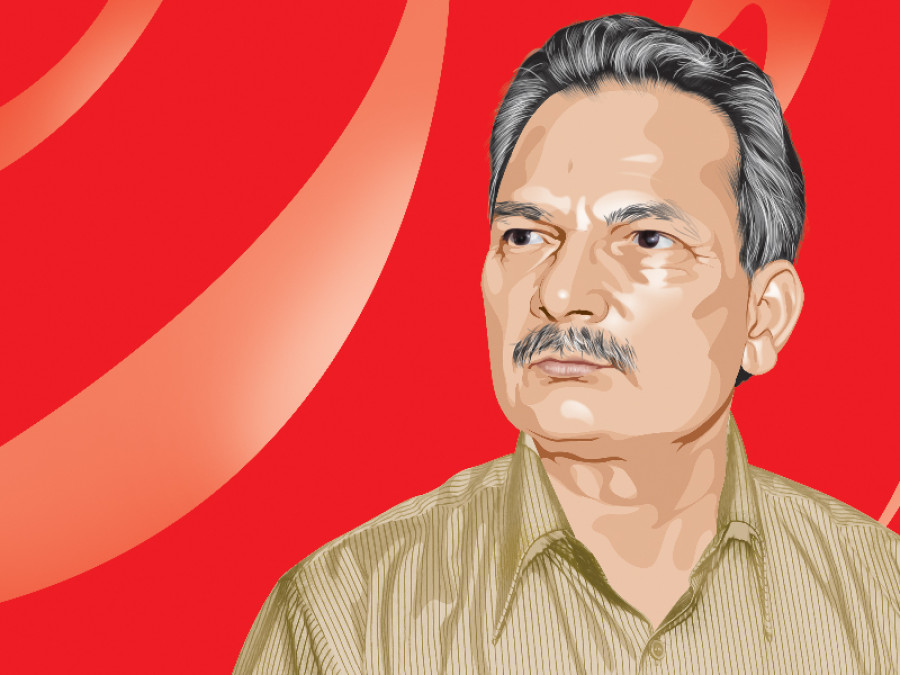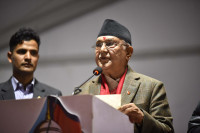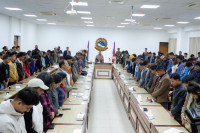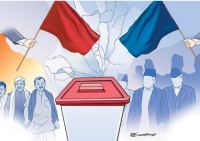Opinion
Lay it on the table
Bhattarai has embarked on a public relations campaign, but his goals are not clear
Randhir Chaudhary
A few days after the new constitution was promulgated, former Prime Minister Baburam Bhattarai quit the UCPN (Maoist) and began his Tarai tour landing first in Janakpur, one of the locus cities of the Madhes movement. His prescheduled visit had been postponed to September 27 after he reportedly agreed to burn copies of the constitution in Janakpur as demanded by the protesting cadres. Although he was not welcomed wholeheartedly there, his visit in such a scenario helped to bridge the gulf between Kathmandu and the Madhes.
Bouncing back
On February 4, 1996, Bhattarai had submitted a list of 40 demands to the Sher Bahadur Deuba-led government and threatened to launch an armed revolution if they were not met. In the charter of demands under the sub-heading ‘Demand Concerning People’s Democracy’, Bhattarai had demanded that regional discrimination between the hills and the Tarai should end. He had argued that backward areas should be given regional autonomy, and that there should be a balance between rural and urban areas. Similarly, under Demand Concerning Nationality, he had written that the open border between Nepal and India should be regulated, controlled and systematised.
Now, almost 20 years later, the Tarai has been agitating for almost two months seeking an end to regional discrimination. In the last two months, over 40 people have been killed in police firing during protests. The Tarai agitation took a new turn after the Madhesi forces imposed a blockade at border entry points, choking off essential supplies and petroleum products.
But the grievances of the Tarai were not addressed when Bhattarai was in the Constituent Assembly (CA). People across Morang, Saptari, Siraha, Dhanusha and Mahottari are, therefore, very angry with the state for failing to address their grievances in the constitution. Still, they seemed to have pinned their hopes on the UCPN (Maoist) and particularly on Bhattarai. But Bhattarai should ponder on why marginalised people would follow him if he only championed the cause of economic revolution and not political autonomy too.
Is the new power a stunt?
After the humiliating defeat of the UCPN (Maoist) in the second CA election, Bhattarai has been saying that a new political force is what the country needs, which sounds good indeed. Now that he has quit the UCPN (Maoist) Bhattarai has to explain his ideas to the people. After the promulgation of the new constitution, all the parties and their leaders have already begun selling dreams of a new Nepal. Even the top leaders of the CPN-UML and the NC are busy meeting Nepali business tycoons after Bhattarai initiated the process recently.
People are not certain about the success of Bhattarai’s vision of a ‘Naya Shakti’ (new power) on three grounds. First, Nepalis are deeply divided ethnically. The politics of the Madhesi/Tharu population is tilting towards regional politics, and Bhattarai is trying to cash in on it Voting in the Madhes is largely based along caste lines. And in such a deeply divided society, how will Bhattarai succeed?
Second, to make any political project successful, one needs to have a political grip on the state apparatus. As we all know, it is very hard or almost impossible to create a new political doctrine in a country like Nepal where politics is guided by parliamentary processes. Political agendas are implemented with the support of the majority in Parliament. Bhattarai might do well to remember the criticism he had faced after his bold and phenomenal decision to expand the roads in Kathmandu Valley. Furthermore, there is a large group in Nepal that does not want the empowerment of marginalised groups, and Bhattarai is trying to stick to marginalised issues.
Third, Nepal which is sandwiched between India and China, needs to seek cooperation with both the neighbours for its economic development. Meanwhile, China has been doing internal lobbying for the unification of all the communist parties, but after Bhattarai quit the UCPN (Maoist), China is presumably unhappy with him. The international community always gives value to the parties in power or the parties that have the potential to rule the country in the future. How will Bhattarai convince Nepali businessmen and guarantee their investment when they are afraid of the mere mention of the term ‘socialism’ in the constitution?
Once, the current PM Oli had even called all the businessmen and asked them not to be scared of the word ‘socialism’ inserted in the preamble of the new constitution. Bhattarai has, thus, given many reasons to doubt him. Moreover, the ordinary people are still not clear about his roadmap and the chances of its success. Bhattarai needs to clearly explain his vision to the people.
Best of luck
Going by the way Bhattarai quit the Maoist party, it looks like a knee-jerk reaction. But he can no longer go back to his erstwhile party which he has called “a house which has been tagged with a red sticker”. So he needs to unite all the small parties throughout the nation. He can attract like-minded youths of different big parties. He also needs motivate the Nepali diaspora which seems to be committed to investing in the nation.
Chaudhary is associated with Terai Human Rights Defenders Alliance




 12.12°C Kathmandu
12.12°C Kathmandu










